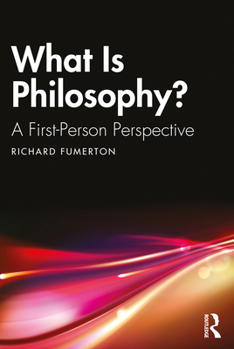What Is Philosophy?: A First-Person Perspective
Select Format
Select Condition 
Book Overview
As philosophy departments attempt to define their unique value amid program closures in the humanities and the rise of interdisciplinary research, metaphilosophy has become an increasingly important area of inquiry. Richard Fumerton here lays out a cogent answer to the question asked in the book's title, What Is Philosophy?. Against those who argue that philosophy is not sharply distinguishable from the sciences, Fumerton makes a case for philosophy as an autonomous discipline with its own distinct methodology.
Over the course of nine engaging and accessible chapters, he shows that answering fundamental philosophical questions requires one to take a radical first-person perspective that divorces the truth conditions of philosophical claims from the kind of contingent truths investigated by the empirical sciences. Along the way, Fumerton briefly discusses the historical controversies that have surrounded the nature of philosophy, situating his own argument within the larger conversation.
Key Features
Illuminates the unique role of thought experiments and especially the "paradox of analysis" in understanding the purpose and value of philosophy Shows that philosophy asks fundamental questions, unanswerable by the sciences, that are critical to thinking clearly and rationally about the world Highlights the distinct character of philosophical questions in specific subject areas: philosophy of language, epistemology, ethics, philosophy of mind, and philosophy of science Concludes by making a unique case for philosophy's contribution to cross-disciplinary work in ethics, politics, mathematics, and the empirical sciences Written in a way to be engaging and accessible for advanced undergraduate readersRelated Subjects
Philosophy




